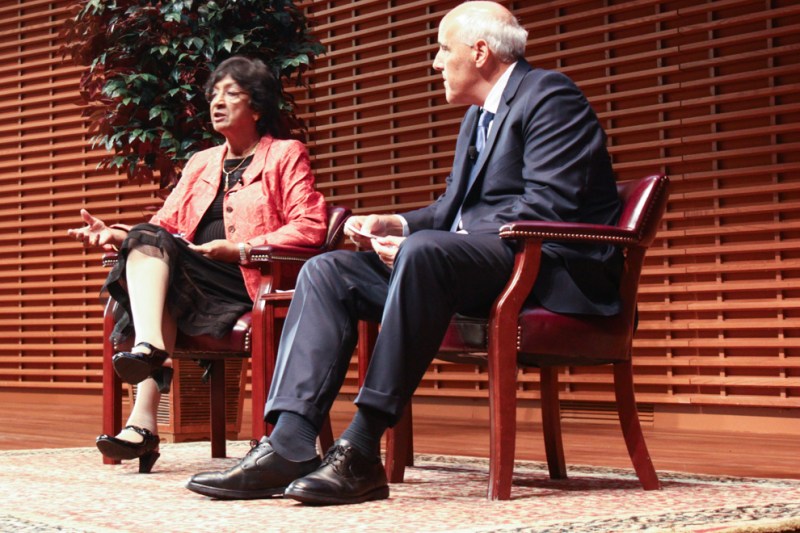Former U.N. High Commissioner for Human Rights Navi Pillay gave the inaugural HANDA Center Lecture on Human Rights Tuesday night in Cemex Auditorium. Pillay reflected on her time as High Commissioner and discussed current human rights conflicts around the world.
Pillay was born in South Africa and served as the first non-white female judge on the country’s High Court. Later, she served as a judge at the International Criminal Court and as the President of the International Criminal Tribunal for Rwanda. She took over as U.N. High Commissioner for Human Rights in 2008 and held the position until 2014.
During her discussion, Pillay took time to address prioritizing certain human rights over others, emphasizing that it could not be done.
“My interpretation is that all human rights are important to all individuals. You can’t actually grade the human rights and say one is more important than another,” she said.
The comment came after recounting that by the end of her six years as High Commissioner, she had pointed to 55 countries by name with human rights concerns.
“My aim was to be inclusive and focus on all concerns,” she said. “A few developed countries objected to me shining the lens in their backyards on discrimination for instance against minority groups… They said I should be instead focusing on gross human rights violations in conflicts where thousands of people are being killed.”
Pillay’s work focused largely on previously unaddressed minority groups whose human rights had not been ensured, including LGBT individuals, migrants and people with albinism. Her efforts to address human rights for the LGBT community were met with hesitancy from the Arab world and Africa.
“They said by doing so I was creating new rights,” Pillay said. “I should adhere to internationally agreed rights, and these rights are not internationally agreed. I took the approach that the universal declaration of human rights to which they all subscribe speaks of equality and nondiscrimination and I find here a group of people who are being discriminated against and not being treated equally.”
Pillay noted that she addressed the issue carefully from the perspective of violence and discrimination. The efforts resulted in the High Commissioner’s office preparing studies on the international prevalence of homophobia, violence and discrimination against LGBT individuals.
Discussing the current conflict in Syria and the human rights violations in the region, Pillay called the U.N. Security Council’s lack of action a failure.
“By their failure to agree and act collectively in the face of horrendous violations they were responsible for the deaths of thousands of people in Syria,” she said.
After her lecture, Pillay answered questions submitted by the audience. One question was asked about the belief that the U.N. forces “Western” notions of individual human rights onto the rest of the world.
“Pain is pain. Whether you’re a woman from a developing country or you’re a Western woman, if you’re being beaten up the pain is the same,” Pillay responded. “In my time, at least, I heard less and less that these are Western notions. In fact the universal declaration was drafted not just by Western states but all states including Africa, including Egypt.”
Contact Sam Premutico at samprem ‘at’ stanford.edu.
